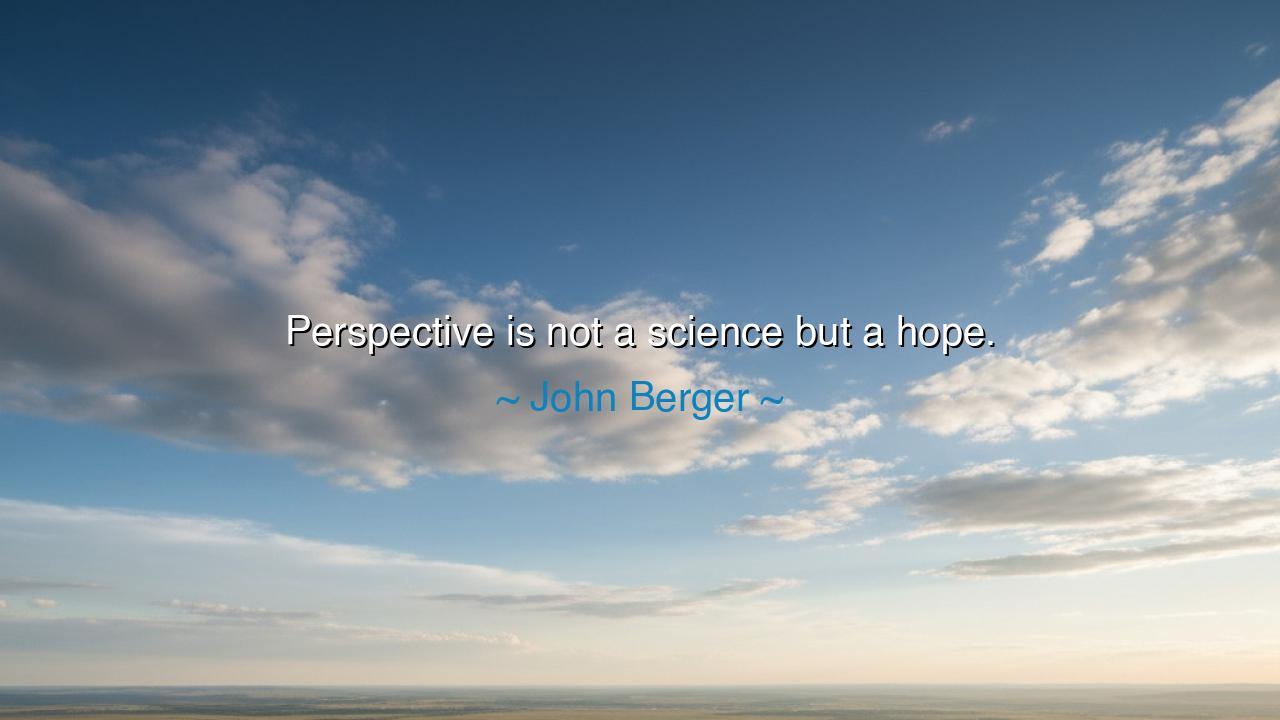
Perspective is not a science but a hope.






“Perspective is not a science but a hope.” So declared John Berger, the poet of vision, who saw the world not merely through the eyes, but through the soul that looks behind the eyes. In his time, many spoke of perspective as a matter of lines and angles, of vanishing points and measurements. But Berger, the seer, knew that perspective is not born from geometry—it is born from longing. To see the world clearly is not to measure it precisely, but to believe that meaning still lives within it. Thus, perspective is not the cold logic of a scholar—it is the quiet hope of a heart that seeks connection amid the vastness of existence.
In the age of the Renaissance, artists discovered perspective as a science. They drew grids upon their canvases and taught the eye to trace the illusion of depth. Yet even as they mastered form, something deeper stirred within their work—a yearning to make the world whole again, to bring heaven and earth into alignment through vision. What they truly sought was not the perfection of distance, but the hope that through seeing rightly, one might understand one’s place in the divine order. In this way, the painter and the pilgrim shared a single quest: both looked beyond the horizon of sight toward the unseen truth.
Consider the story of Leonardo da Vinci, the eternal student of both art and nature. He studied optics, anatomy, and light itself, yet he confessed that the more he understood, the more he was filled with wonder. His sketches of machines and faces, rivers and storms—all were acts of hope, not certainty. Leonardo’s perspective was not scientific precision alone; it was a vision of what might be possible if humanity could see the world through both reason and reverence. For him, every stroke of the brush was a prayer that the visible and the invisible might finally meet.
To hold perspective, then, is to stand at the edge of mystery and still choose to see. It is to gaze upon chaos and imagine order; to look upon suffering and still perceive meaning. Science may tell us how light bends, how distance diminishes form—but hope teaches us why we should look at all. It whispers that beyond the fractures of experience lies a deeper unity, one that only faith in beauty can reveal. Thus, perspective becomes not a tool of the mind, but a vow of the spirit: to keep seeing, even when the world seems darkened.
Think also of Nelson Mandela, who in the long winter of his imprisonment did not lose sight of the sun. Behind the walls of Robben Island, his world was small—a cell, a bucket, a barred window. Yet his perspective remained vast, stretching beyond the sea to a future he could not yet touch. It was not science that sustained him, nor certainty, but hope—the belief that human dignity could rise again. When he was freed, his vision had not withered but sharpened; he saw his enemies not as demons, but as fellow travelers blinded by their own fear. That was the true art of perspective—the seeing of others with the eyes of the heart.
So it is with all of us. We may think that perspective is a matter of intellect—of gathering facts, of calculating truths—but the ancients and the poets know better. Perspective begins where knowledge ends. It begins when, standing before the unknown, we refuse to turn away. It begins in compassion, in imagination, in the hope that our small view can still reveal something eternal. To see the world rightly, we must love it despite its imperfections, as the artist loves the flawed marble from which beauty will emerge.
Therefore, let this teaching take root in your soul: Perspective is not a science but a hope—a light that the wise carry into the shadows of uncertainty. Cultivate this light. When life narrows around you, widen your gaze. When despair tempts you to see only endings, look again, and find the hidden beginning within. Practice seeing others not as obstacles but as reflections of your own journey. For perspective is not about what lies before your eyes, but about the hope that guides your sight—and in that hope, the world becomes radiant once more.






AAdministratorAdministrator
Welcome, honored guests. Please leave a comment, we will respond soon